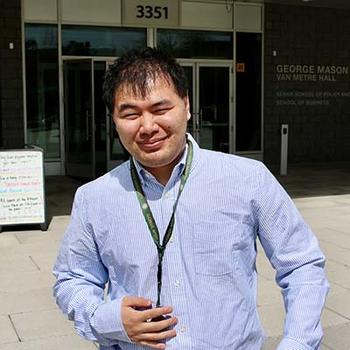In This Story

Life hasn’t always been easy for Ben VanHook, beginning with his abandonment as an infant in a train station in China by his biological parents. After his adoption by an American family and a move to Vienna, Virginia, VanHook was bullied by peers and misunderstood by authorities at public schools.
“They didn’t really have what they needed to support me and my needs,” he said.
VanHook has autism, a spectrum disorder that affects communication and behavior. It’s classified as a “neurodivergent” condition, accounting for millions of similarly affected people around the world.
In an effort to help his early education situation, VanHook’s parents enrolled him in a series of private schools.
Attending exclusive—and expensive—schools benefited him, and VanHook realizes he had it better than most. “A lot of my passion lies in the fact that not many neurodivergent people have the resources that I did,” he said. “Many school systems are not set up to support neurodivergence; they didn’t have neurodivergent individuals in mind when implementing their programs and their course curriculums and training.”
VanHook is devoting his professional life to reforming education policy at the highest levels to make life easier for other neurodivergent students. To this end, VanHook is enrolled in the Schar School of Policy and Government’s Master of Public Policy program with an emphasis on education policy, where he is learning essential skills to accomplish his goal of “reforming education to be more inclusive of neurodivergent individuals.”
He has put his studies on temporary pause—he’s about halfway to his degree—as he finds himself busy as an accidental leader in a rapidly growing social movement that echoes his own goals. In early April, VanHook found himself on an international video panel for the United Nation’s World Autism Acceptance Day, where he spoke about “transitioning away from the mere acceptance of autism and into an era of appreciation.”
The UN invitation came thanks to his rising profile in the advocacy world, in which he travels the country speaking on behalf of the neurodivergent. An official at the Institute of Neurodiversity in London told VanHook he’s been following his work and wanted him to help with the UN panel. “Just having these connections and being able to share my message around the globe had really helped the community trust me. To have even been trusted to take on such a role is so meaningful.”
VanHook brings his penchant for advocacy to the classroom, which his professor welcomes.
“Ben was a huge asset in my [master of public policy] higher education policy class,” said Schar School professor Anne Holton, a former Virginia secretary of education (2014-16). “I learned so much from him, as did his classmates. He is passionate and persuasive in his message that neurodiverse individuals belong in college, and his personal story of persistence and resilience is the best evidence.”
When VanHook is not speaking at conferences in such places as Stanford University, Los Angeles Trade-Technical College, and Philadelphia ‘s Chestnut Hill College’s autism program—or posting moving essays on his LinkedIn page, VanHook works as a community support coordinator at the nonprofit Organization for Autism Research near his home in Arlington, Virginia. He’s currently developing a self-advocate advisory council for the agency.
“We’re dedicated to supporting the autistic community through applied research studies,” he said. “Nothing biomedical, it’s how we can support people’s environments and how we can improve outcomes.”
His impression of the last few years: “It’s really been a wild journey,” he said.
